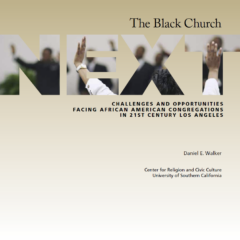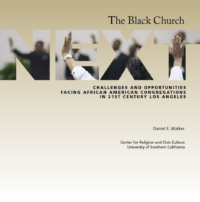Lessons on Social Engagement in the Post-Civil Rights Era
For most of its history, the Black Church served as the spiritual and political center of the African American community. From the strident advocacy of Bishop Henry McNeil Turner, a 19th century AME Bishop, to the leadership of Martin Luther King Jr., Ralph Abernathy, and Malcolm X during the civil rights and Black Power movements, faith-based institutions and their leaders were able to activate their parishioners by articulating both the hopes and dissent of the masses. Without access to traditional fundraising machines, as African Americans moved into the political mainstream they did so with a foundation firmly rooted in the social advocacy, organization models, and financial purse strings of the African American church.
Imbued with religious imagery and symbolism, Barack Obama’s election as President of the United States circumvented many of the traditional strategies of mainstream politics. Using the internet, 24-hour news networks, and cell phones to spread the message, many of the strategies employed during the 2008 campaign were first showcased in organizing efforts regarding the Jena 6 case.
The Incident
In December 2006, a white student was attacked by a group of African American students in the small town of Jena, Louisiana. Although the victim attended the school dance later that evening, the perpetrators of the incident were eventually charged with attempted murder for their role in the incident. For many African Americans, the decision to charge the minors with the maximum sentence possible echoed the historic and contemporary abuses so often visited upon African American males in the criminal justice system.
The Response
While the mainstream media generally ignored the story, a new generation of African Americans took to the internet to draw interest to the case. On September 20, 2007, upwards of 20,000 people, drawn primarily from social networks such as Facebook and the encouragement of nationally syndicated radio personalities Tom Joyner, Michael Basden, and Steve Harvey, descended on the city to voice their displeasure with the proceedings.
Comments In addition to providing specific evidence of the power of social networking and an increasingly unified national Black radio audience, the case of the Jena 6 also provided the first act in a dramatic battle between the traditional African American religious establishment and a new generation of social activists tied to the Internet, syndicated radio, and the candidacy of Barack Obama.
Encompassing showdowns with Jesse Jackson, Bill and Hilary Clinton, and Obama’s former pastor, the Reverend Jeremiah Wright, the new generation of African American social activists confronted and defeated symbol after symbol of the traditional Black political and religious establishment. Nowhere was this victory more evident than in the 2008 California Democratic primary. Although rival Hilary Clinton lined up every major Black political and religious endorsement in Los Angeles, the African American community rejected the “wisdom” of the establishment and gave Obama 86 percent of their vote. (The 2008 Leavey Center Presidential Primary Exit Poll)
Questions
- Is there still a role for traditional faith-based social activism in 21st Century Los Angeles?
- Can social networking and the Internet be used to create a sustainable faith-based social justice movement?
The Faith of Obama
Consequences and Opportunities for the Black Church
The election of Barack Hussein Obama as the 44th President of the United States of America was a watershed moment for both the nation and the Black Church. In addition to its obvious historic and political significance, the election also signaled the arrival of a new and powerful spiritual voice for African American communities. More than just the employment of a key religious phrase or scriptural reference, Obama’s “A More Perfect Union” discourse also showcased the Illinois Senator as an accomplished preacher. Delivered in the midst of a national hysteria centered on comments made by his former pastor, Jeremiah Wright, Obama’s oration was the most compelling national “preaching” moment since Martin Luther King’s “I Have Dream” address in 1963.
When coupled with his victorious “Yes We Can” speech the night he won the election, the pilgrimage of hundreds of thousands of African Americans to the Presidential Inauguration, and the “eulogy/praise service” he delivered in January 2011 following a shooting spree in Arizona, there are very few faith leaders, irrespective of race and religious tradition, that can rival his homiletic prowess or popular appeal.
Comments Nearly 20 percent of African Americans who attend church in Los Angeles are members of just five congregations—The Crenshaw Christian Center, Faithful Central Bible Church, West Angeles Church of God in Christ, First AME, and the City of Refuge. Given the past history of the Black Church as the training ground for both sacred and secular leaders, it is still unknown how the concentration of so many of the city’s African American residents in so few spaces will affect the community in the coming years.
While one might lament this change in social organization as a sign that the Black community will be without an ample supply of advocates in the future, this new reality may also signal that African Americans are now quite comfortable with leaders culled from the traditional fields of business and government service. As evidenced by the election of Governor Duvall Patrick in Massachusetts and the existence of a host of other Black politicians and non-profit administrators throughout the country, many serving constituencies that are not majority African American, it seems quite evident that in the 21st Century religious ordination is by no means the only pathway to relevancy in the hearts and minds of Black communities.
Questions
- Does the status of Barack Obama as both a spiritual and political figure undermine the influence of African American faith leaders?
- How do faith leaders balance their support for President Obama with the doctrinal mandates of their respective faith traditions?
Daniel Walker was a research associate with the USC Center for Religion and Civic Culture until 2012.


